Can we have it all? Here we are featuring some stories of women who have certainly managed to have a great deal: a successful scientific career and a family. How do they do it? (Note: many of our writers have been promoted since their pieces appeared, but for now we are leaving the annotation as their role at the time of writing.)
Claire Gillan
Associate Professor of Psychology at Trinity College Dublin
Claire’s lab studies the cognitive neuroscience of mental health conditions
I had my first baby in my second year as an assistant professor and my second in my fourth year. I took 6 months leave for both (but see below for what that actually looked like). I got promoted to associate professor that same year and my contract made permanent. It wasn’t easy, but it wasn’t awful at all.
Some thoughts on maternity leave and beyond.
- I had to work during my mat leaves. I had students, postdocs that deserved supervision, comments on their papers, etc. I also had projects that I felt needed me to keep pushing to get them off the ground.
- For my first mat leave, I didn’t do grant reviewing, paper reviewing, admin, talks or anything like that. But after a break of around 4-6 weeks, I had video calls with my team and answered emails and slacks in a fairly ad hoc way. Baby was usually on the calls with me. I brought baby in for lab meetings.
- For my second mat leave (during COVID pandemic), the team was a bit bigger, the projects more complex and so I had more work demands on my time than before. I again didn’t do any service, but met with my team on the regular. With a bigger team I found Slack too distracting day to day (and sort-of stressful) and I had a few more commitments (papers due etc) so I decided to work Fridays for a full-day and not in-between. I did so for the most of the second half of my leave (with variable success in terms of the in-between part). My husband took this day off work to support me to do this (and loves a 4 day week now!). This protected our weekends together as a family.
- A big caveat to the above is that I wanted to work during mat leave. I love my children, but babies are basically potatoes for the first 6 months of life. I yearned to talk to my group, think about complex problems, wrangle data, listen to talks. I love my job and I didn’t want to be away from the lab for so long. I worked hard to build it and stepping away for 6 months was out of the question for me.
- Regarding work-life balance now, having returned to work and finished reproducing, I think we have it pretty good. My partner and I split pick up and drop off. I start work early and finish early so I can pick up the girls and have decent time with them before bed. It’s not all hair-braiding and cookie-baking because… it is sometimes hard to muster the energy at the end of the day so despite best intentions, there is usually a dose of guilt-ridden cocomelon. But it works well for us.
- I don’t work weekends or evenings. I am much more efficient during the day because of this. I think I am as productive as before, if not more.
Marlene Cohen
Associate Professor, Department of Neuroscience and the Center for the Neural Basis of Cognition, University of Pittsburgh
Marlene’s lab studies how processing of visual information is modified by task demands and by attention.
I had my first baby five months after starting my assistant professor position and my second four years later, and I spent many late night nursing sessions gobbling up the wisdom on this page. I found myself dragging my feet about writing my own entry because I wasn’t sure what I could add.
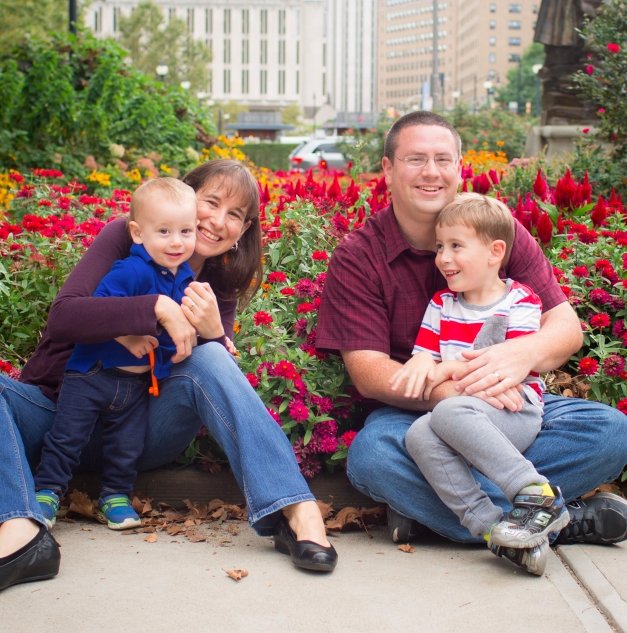
But as the dust has settled in my new lab and in my new family, I realized that not only have I found my own twisty, turny route through motherhood and science over the last few years, but there are many ways in which having kids has helped my career. I don’t mean to overstate this: there are days in which there is simply not enough of me to go around and my to do list is panic-inducing. But in case it helps someone who’s panicking themselves, here is a list of ways in which motherhood has helped my career.
- Having down time lets me be creative. It is not an exaggeration to say that my two best scientific ideas in the last few years happened while I was rocking a baby to sleep. Having time that I am not actively engaged in something that uses my brain is key to my creativity. This is a good reason to make time for exercise as well – many of my other good ideas came while swimming laps or going for a walk. (For what it’s worth, I also have a lot of terrible ideas at those times too. But we all know that having a big sample size is necessary to extract signal out of the noise, so more time for generating ideas is better than less.)
- I work more efficiently. I used to think I needed at least a two hour stretch of time to get any writing done. Now, if I have 15 minutes, I can hammer out a paragraph, and those paragraphs add up.
- I am not as rigid about how tasks should be done. Being a mom and being a PI both make it necessary to be flexible. None of the 12 papers my lab has published have had a very conventional division of labor, but we found a way to get the science done and get the papers out the door. That flexibility has helped me both at work and at home.
- I am better at asking for what I need. I’ve never been particularly good at asking for help or negotiating, but there have been times these past few years that I had no choice. This forced practice has made me better at negotiating even when it’s not quite as desperate.
- I am better at saying no. When I realize that agreeing to review that paper I’m not interested in or go to that not-so-interesting conference or serve on that boring committee means that I will have less time to devote to my kids or to actually doing science, saying no seems like a much easier decision. Before having kids, I felt like I could say yes to everything without a cost. I realize now that that wasn’t true then, and it’s even less true now. Saying no makes me a better scientist and a happier person.
- I don’t feel as guilty when I am not at work. Before kids, I was always either working or feeling like I should be working. Now there is somewhere more important for me to be, and that space has been good for me as a person and as a scientist.
The way I run my personal and professional lives is often chaotic and messy, and there are days when nothing goes according to plan. But it’s also rich and joyful and satisfying in so many ways. Best of luck with your journey!
Leslie Vosshall
Robin Chemers Neustein Professor, Howard Hughes Medical Institute Investigator, The Rockefeller University, New York
Leslie’s lab studies innate behaviors in insects (vinegar flies and mosquitoes) as well as humans. The work centers on how olfactory signals are detected and how they produce behaviors.
My first experience with biomedical research was in Woods Hole, MA at the Marine Biological Laboratory in 1982. Scientists set up summer labs up there, doing science, training graduate students in courses, all while bringing along their families—children, pets, au pairs, grandparents. Whatever it took to make this work was provided. MBL organized child care, camps for children, and activities for non-scientific spouses. So, being raised in such an environment, I came to expect such support in the “real world” outside of the summers on Cape Cod.
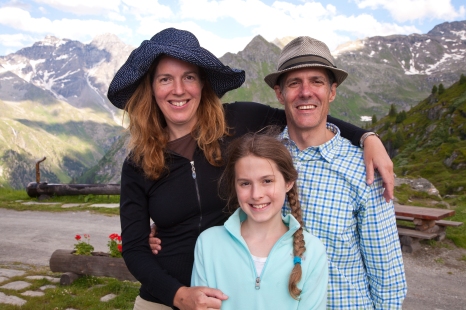
I have been lucky in having this kind of support at my own institution but also forthright in asking for it outside of Rockefeller, where things are considerably less supportive. Science seems firmly stuck in the “Mad Men” era: scientists are assumed to be male, with non-working spouses at home to mind the children. So conferences are scheduled at any time during the school year and on weekends, and child care is not the business of the institution or the conference organizers. It is assumed that the scientist’s wife will take care of everything on the home front. If women wish to be scientists, well, then they should be single and childless. Or perhaps they should be heiresses, who can pay for a coterie of au pairs to follow them in private rented accommodations near the conference site. Such archaic attitudes and the system they create go a long way toward explaining the chronic underrepresentation of women in biomedical science that persists despite several decades of gender parity in PhD degrees granted.
My institution, The Rockefeller University, guarantees child care for all of its tenure-track faculty. Once you are expecting, you notify human resources, and as soon as the baby is three months old, the child is minded 8am-6pm Monday to Friday. This is exceedingly rare in academia—many colleagues tell me of long waiting lists at their local university day care center and having to juggle to arrange child care. If institutions want to recruit and retain the best and brightest young faculty, they must do more to provide child care commensurate with community needs.
So here are some things to consider when combining a career in science with parenting.
- Pick your partner carefully. My husband puts up with my epic career selfishness and is more than an equal partner at home. We both travel a lot and most of the time manage to schedule things so that one parent is at home at any given time.
- Have a deep bench of back-up caretakers. If there are no grandparents or other relatives nearby, make sure you have at least 3 caretakers with enough flexibility to step in when there are childcare emergencies. In some cases this means you are paying someone on retainer to be available even if you do not use them. It sounds crazy, but it’s worth it for the occasional emergency when your husband is already on the road and your flight is delayed and there will be no one to pick up your daughter from school.
- Earn enough money to make all this work. Children are expensive and babysitting cannot be expensed. So talk to your department chair or other decision-maker and tell them you need a raise. They are probably underpaying you anyway because you failed to negotiate an appropriate salary!
Nicole Rust
Associate Professor, Department of Psychology, University of Pennsylvania
Nicole’s lab combines behavioral, neural and computational approaches to understand where and how the brain stores visual memories.
The events of last handful of years have certainly been a bit of a blur, as my my partner and I both pursued tenure, and our two children (now 1.5 and 4) joined us midway. If I had the opportunity to do it all again, I would tweak some of the details, but definitely not the substance!
It can, of course, get very intense. What makes it work (when it’s working)? I think that one of the most underappreciated things about being an academic is the flexibility. Grand things have to happen, but there are very little constraints on exactly when or exactly how. And that’s great, because the “best how” is not only different for every individual, but it can quickly change (with every pregnancy and every grant deadline). I have found it useful to try and think out-of-the-box, and I have exploited flexibility in different ways at different times – such as working at home for extended stretches when my kids were infants (thank you Skype!) and periodically sneaking into work at 4am when I wanted to make a clearheaded push.
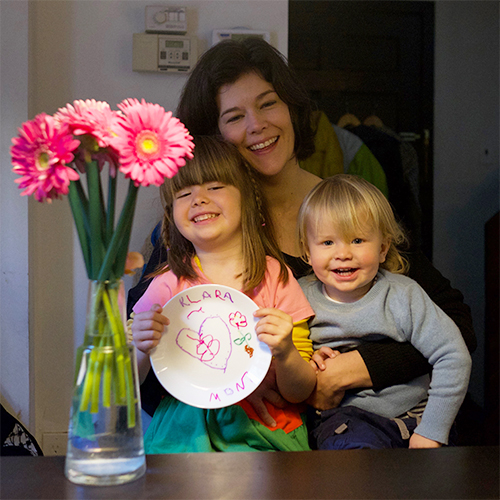
I also find that I can be more effective in 15 well rested minutes that in 4 sleep deprived hours and as such, I try to be very thoughtful about minimizing the things I commit to. While it often feels selfish to say no, if the cost of a yes is a bit more misery across the board, no is often a better answer.
And I (like so many other women on this page) cannot over-emphasize how valuable it is to have a partner who is supportive of both my family and my career, as well as an amazing nanny!
Ilana Witten
Assistant Professor of Psychology and the Princeton Neuroscience Institute, Princeton University
Ilana’s lab studies the neural circuits underlying learning and decision making.
Growing up with both parents as scientists, it never occurred to me that family and career should (or could) be either/or. And it’s important for me to model that balance for the next generation as well! I had 1 daughter as a postdoc, and the 2nd as an assistant professor. I found that having the 2 kids across 2 career stages worked well, in that there was not too much strain on any 1 stage. When I think about career and family, here is my advice:
- The most essential advice is to get as much help as you can with kids and family responsibilities. This ican come from a combination of hiring lots of help (babysitters, house-cleaning help, etc), a supportive partner, grandparents or other family members in the area, etc. The more help you have, the more energy you have for family and for career!
- Working efficiently is key — I think it makes a much bigger difference than working long hours. Everyone has a different strategy for working efficiently, and there’s no “one-size-fits-all” approach. My strategy is to keep an up-to-date to-do list, and work on any 1 item near the top of that list only for as long as I am making efficient progress, be it 15 minutes or multiple hours. As soon as I notice I am no longer being efficient, I take a break, then switch to a different task that seems more appealing at the moment.
- Everyone has different strengths and weaknesses. By putting thought into identifying your strengths and weaknesses so that you can play to the strengths, you will be happier and more successful – and have more time for family or outside interests as well.
- I strongly recommend Sharyl Sandberg’s “Lean In”. Even though it was intended for business, much of the advice applies in academia as well – unfortunately academia isn’t free of the sexism that’s found in business. The book is full of concrete and effective advice for how women can fight sexism and progress in their careers, from how to speak up for yourself to how to make use of mentors.
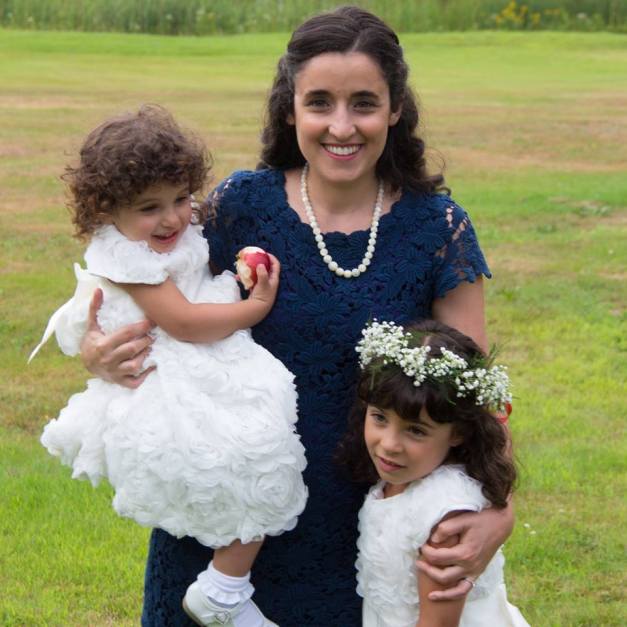
Marina Picciotto
Charles B.G. Murphy Professor in Psychiatry, Deputy Chair for Basic Science, Professor of Neurobiology and Pharmacology, Yale University, New Haven CT
Marina’s lab studies the molecular basis of behaviors related to addiction, feeding and learning, with a focus on nicotinic acetylcholine receptors and downstream signaling molecules.
I loved science from early on, but I didn’t know what a scientist did. When I was a senior at Hunter College high school in New York, I had to get an internship and got a job in a lab studying the neurobiology of feeding. Once I started working in neuroscience, I became a lot more focused and I was subsumed into life in a lab. My proudest early moment as a scientist was probably when I was an undergraduate, cloning a gene for the first time and waiting by the Xomat for the autoradiogram to come out, when I saw read the sequence I knew encoded the amino acids of the protein we were trying to clone. That was incredibly cool.
My college lab mentors often bragged about the fact that they never took vacations and frequently threatened to throw people out of their labs for not working hard enough. I thought it was a badge of honor to be in the lab every weekend and to stay as late as possible doing experiments in the lab. At first my personal life and my lab life were mashed together, and I valued that, but then I did my postdoc in France, where they shook their head about the poor American who didn’t take advantage of the cultural and emotional life outside the lab. I learned that I could be serious about science and still spend time doing other things that I enjoyed. This made it possible for me to make space for my partner when I came back to start a faculty position, and even more so, it let me be productive while only being in the lab during day care hours when our daughter was born.
So my advice for combining science and family is:
1) Don’t be afraid that the structure of daycare or school hours will decrease your productivity – sometimes that boundary and structure can actually increase productivity by making the time in the lab more efficient.
2) Get onsite childcare if possible. My daughter started daycare at the university a block from my lab when she was 3 months old. This allowed me to walk over to feed her and allowed me to maximize the time in the lab and with her, without having a commute between the two. By the time she started school, with an after school program until 6PM and a before care program for early meetings, we had the drop off and pick up rhythm down.
3) Travel when you need to, but find ways to coordinate your schedule with your partner. As a two-neuroscientist couple, we took several trips to meetings together as a family when our daughter was young, because both parents attended several of the same meetings. Splitting the childcare between partners and with other scientist couples who travel with their kids sometimes made long meetings more tolerable. The time that I was traveling was also great father-daughter time. My daughter found her passion for rock climbing because of a father-daughter adventure when I was away giving a talk.
4) Don’t be afraid to be role model for other parent-scientists. The more of us who are both obvious parents and effective scientists, the more we will be able to convince our students and postdocs of both genders that they can stay in science and create a satisfying family life.
Sharona Gordon
Professor, Department of Physiology and Biophysics, University of Washington, Seattle
Sharona’s lab studies the mechanisms of activation and regulation of TRPV1 channels, which are critical for sensations of heat and spiciness and physiological responses to temperature and mechanical strain.
I have always known exactly what I wanted. From watching Carl Sagan and David Attenborough on PBS, I knew I wanted to be a scientist and probe the unknown. I went to college and majored in a new field, “Neural Science.” I also did something less traditional… I got married after sophomore year at age 18. This isn’t something I recommend or that I want for my own children, but I met my husband and knew what I wanted. Four kids and twenty five years later he is still my best friend.
My children are well dispersed through all stages of my career. I had a graduate school baby, a postdoc baby, an assistant professor baby, and an associate professor baby. They span 14 years. I breastfed them a cumulative total of 8.5 years.
A number of circumstances contributed to helping me sustain my career. First, in my twenties I had boundless enthusiasm and endless mental energy. Second, my husband has carried at least half the load, at least on average over time. Third, the kids were spaced out so that we never had more than one in diapers and the older kids helped with the younger ones. Fourth, my mother had polio as a toddler and raised 5 kids from a wheelchair. With her as a role model, it never occurred to me that there was anything I couldn’t do. Fifth, I had access to high-quality daycare, which I used starting as early as each center allowed. Finally, I had amazing mentors who believed in me as a scientist and as a person.
My advice to junior scientists – whether male or female and whatever their family situation: Take care of your physical and mental health. Eat well. Exercise regularly. Seek help when you need it and accept help when it is offered. Surround yourself with people who care about you and will tell you the truth. Listen. Appreciate your luck when you have success. Take care of the people coming up through the system behind you. Give yourself a break when you can’t take all my great advice.
Lorna Role
Professor and Chair of the Department of Neurobiology & Behavior and Co-Director of the Neurosciences Institute, Stony Brook University (aka SUNY Stony Brook), New York
Lorna’s laboratory studies the role of acetylcholine in the CNS, examining the mechanisms by which ACh receptors fine tune synaptic transmission and modulate behaviors as diverse as memory and mood.
I think I always knew I wanted to do something related to science – I remember learning about circuits (specifically variable resistors and audio volume control) from my dad drawing circuit diagrams in the sand. When -what seems like a zillion years later- I would try to convey to my daughters that I worked on things in the brain that were sort of like the volume controller on neurotransmission, I’d remember those days of learning science from someone who loved it and transferred that to the children he loved.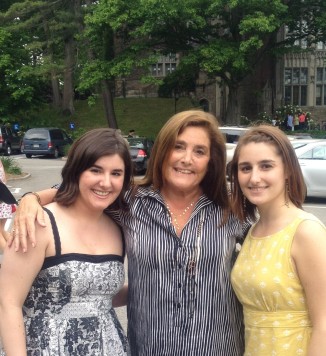
One of the ideas that I have held on to the hardest is that it’s totally fine to be completely devoted to both your family and your career. The greatest joy comes from sharing the wonders of both with other people. I have been proud to co-raise my daughters with wonderful partners and an absolutely astonishing nanny. Career spacing of my girls turned out to be a big help – my first daughter, Lindsay, is 6.5 years older than the second (Masha) . The spacing allowed me to enjoy them each as individuals, and for them to have each other as mutual caretakers and free of any competition between them. I became a single parent (in NYC, freshly tenured at Columbia P & S) when they were 8 and 2 –this was definitely a challenge but I have always been glad that I did both – I love being a mom and doing science. I still remind my girls (and myself and my many female grad students and post docs) that in the children’s book The Little Engine that Could, the train was of the female gender. It may be corny but “I think I can, I think I can” is a truth to hold onto. Because you can do it, too.
Post script: My daughters are 29 and 23 now , both in training in clinical aspects of neuroscience (psychiatry and clinical psychology). Go figure!
Tatyana Sharpee
Associate Professor, Salk Institute, San Diego
Tatyana’s lab develops theories to explain and methods to analyze neural representations and behavior.
My group works on computational principles of how the brain processes information. I am especially interested in the statistics of natural signals and how they might influence the organization and function of the nervous system.
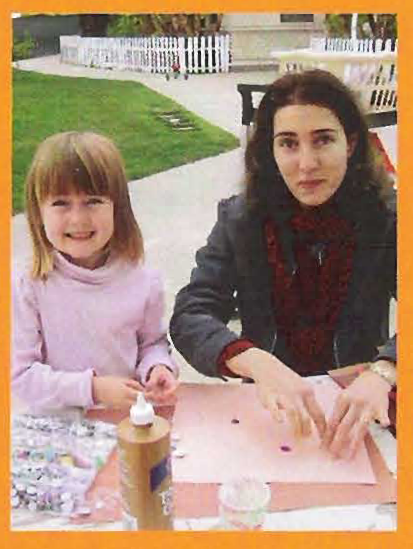 Since childhood, I always wanted to be a scientist but used to worry that this might not be possible to continue once I got married. My grandfather (a scientist himself) would encourage me at a time with words that maybe your husband would be willing help you out, a possibility that I viewed as rather remote. But what do you know, my husband does help me quite a bit. A friend and colleague once said that marriage and children are exercises in negotiation. I would add that having children is an exercise in negotiation with oneself. I cannot spend all the time I want at work and I cannot spend all the time I want with my daughter. However I actually enjoy finding solutions to the ongoing challenges. Maintaining the ability to nurse during travel was one of them. Now where is a good place at this airport/railroad station that is reasonably clean, private and might even have electricity and running water at one location? Found a place? Great! Now repeat this every two-three hours, including nighttime, and do not forget to refrigerate the milk. Cheers, and good luck!
Since childhood, I always wanted to be a scientist but used to worry that this might not be possible to continue once I got married. My grandfather (a scientist himself) would encourage me at a time with words that maybe your husband would be willing help you out, a possibility that I viewed as rather remote. But what do you know, my husband does help me quite a bit. A friend and colleague once said that marriage and children are exercises in negotiation. I would add that having children is an exercise in negotiation with oneself. I cannot spend all the time I want at work and I cannot spend all the time I want with my daughter. However I actually enjoy finding solutions to the ongoing challenges. Maintaining the ability to nurse during travel was one of them. Now where is a good place at this airport/railroad station that is reasonably clean, private and might even have electricity and running water at one location? Found a place? Great! Now repeat this every two-three hours, including nighttime, and do not forget to refrigerate the milk. Cheers, and good luck!
Gwenn Garden
Professor, Department of Neurology, University of Washington, Seattle
Gwenn’s lab studies how disrupted cellular communications between neurons and glia or between neurons in circuits contribute to neurodegeneration.
I was raised by two working parents, so to be honest it never occurred to me that I should cho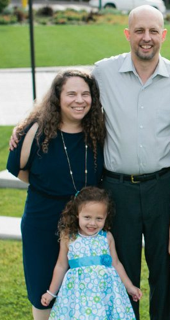 ose between a career and a family. Choosing between things has never been my strong suit, which is probably how I ended up in an M.D./Ph.D. program eventually taking an extra year of internal medicine residency training to decide that I really wanted to be a neurologist. Sometimes my slow decision making process has been useful and other times a hindrance to my career. Parenthood has helped me to spend less time considering every possible outcome or option. I’m hopeful this will be a net gain for my career enjoyment over my lifetime.
ose between a career and a family. Choosing between things has never been my strong suit, which is probably how I ended up in an M.D./Ph.D. program eventually taking an extra year of internal medicine residency training to decide that I really wanted to be a neurologist. Sometimes my slow decision making process has been useful and other times a hindrance to my career. Parenthood has helped me to spend less time considering every possible outcome or option. I’m hopeful this will be a net gain for my career enjoyment over my lifetime.
Thoughts I have for academic women that might be helpful in managing the years with young children. 1) The “right” childcare is a moving target, be aware of your child’s changing needs. The nanny we hired when my daughter was a young infant was no longer right for her when she was an active toddler. The first daycare was great for an active toddler but not so great for a curious preschooler. In the long run, the Montessori pre-school program was unquestionably worth the difficult transition from day care. Don’t be afraid to transition because dealing with the issues that stem from the wrong childcare situation is very distracting from your career goals. 2) Being associated with a university means there are many potential childcare providers available for all kinds of different circumstances. We have been able to cultivate a pool of extra help from undergraduate students, retired technicians, teen-age children of colleagues and post-doc spouses. Activating this pool makes the times I travel so much easier on our family and enables us to handle school holidays and closures without having to dicker over who will do what when the usual childcare routine is disrupted. It also helps the child develop social skills and confidence that they can interact with many different types of people when they are exposed to a variety of caring adults. 3) Try not to waste time worrying about what your senior colleagues think. I was already associate professor when I had my daughter. I didn’t have a grand plan to wait, it just happened that way. My seniority did unquestionably enable the long-view perspective that I couldn’t remember much about my colleagues actions like whether or not the were regularly present and departmental functions or faculty meetings or did their “fair share” of administrative or teaching responsibilities. The only things I remembered was the last time they presented their research or the buzz around a high impact publication. Once I realized this, it became easier to avoid, say no to and/or leave in the middle of a lot of things when what I would rather be with my husband and daughter. 4) Putting in the hard work to help your child become independent is worthwhile. When time is tight, its so easy to just do everything for kids rather then teach them or wait for them to do it slowly. But if you don’t give them the time they need to become independent, they will stay dependent and that is much more frustrating in the long run. I heard the suggestion about storing plates and cups in low cabinets and drawers from an older woman scientist several years ago and immediately implemented it for my step-daughters. At age 5, my daughter already helps empty the dishwasher, gets her own cups of water and helps get everything ready for breakfast. Its a big source of pride for her to be able to help out and do things for herself (Montessori helps with this too). 5) Avoid doing things that you resent doing. My daughter enjoys swimming and gymnastics, but I really don’t like leaving work early to sit in traffic, much less at steamy pools or smelly gyms. I’ve heard many women (even very well paid clinician-scientists in more lucrative specialties than mine) complain they could be more successful if they didn’t have to spend so much time as a chauffeur. If you find yourself complaining, refer to point #2 above and just don’t do what you are complaining about. It will be worth every penny.
The “baby penalty” for women’s careers appears to be a real phenomenon, but the response from academia is ephemeral. I’ve suggested to very established senior women scientists who “did it all” long before anyone wrote about it or studied it, that their assistance in changing the system would be appreciated. The response has generally been along the lines of “I tried it once, now its your turn”. I haven’t had time or energy while I’m in the middle of it, but maybe in a few years, those of us writing here should be aiming for more systemic change?
Marla Feller
Professor, Department of Molecular and Cell Biology & Helen Wills Neuroscience Institute, UC Berkeley
Marla’s lab uses a variety of physiology and imaging techniques to study the development and function of retinal circuits.
I had no idea what I wanted to do when I grew up – though I never imagined it would be a scientist. There were no scientists in my family and I don’t think I ever met one until one fateful semester in high school. That year, the regular physics teacher was on sabbatical so my high school hired someone who had just dropped out of a Ph.D. program to teach the class. Mr. Chevrie, wherever you are, thank-you! That class opened my eyes to the joy of experimental science. I went on to major in Physics in college and stayed in the field to get my Ph. D in condensed matter physics and nonlinear optics. As a postdoctoral researcher, I made a big transition to work in neurobiology. Luckily, a small group of intense scientists – many trained physicists — doing neuroscience research at Bell Laboratories – took me in. That, plus a summer at Woods Hole — and I was hooked.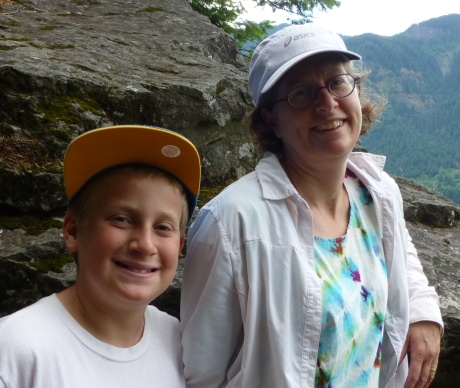
I am part of two-neuroscientists family. I met my husband at Woods Hole. We have both been able to get independent positions throughout our careers – in fact we have felt it has been to our advantage rather than disadvantage. We have one son – who is now 12. On some days, I wish we had had more kids and on others, I am thrilled we can devote so much time and energy to him.
How to make it work? I would love to provide a formula for success. However, the answer to that question is different for every individual. I think this is the most important message that I would want to get across. When it comes to managing family and career, everyone is different. And even a given person will change – it might feel better to spend more time at work some weeks and less others. My story is not so rosy — up until the moment I received tenure, I felt like my career was going to sputter away. I was always an advocate for everyone around me, but somehow couldn’t manage to internalize these positive feelings toward myself. In retrospect, I wonder how much of this poor self-image came from a lack of role models. Now, I am surrounded by successful women scientists and I feel much more comfortable. Importantly, I never took myself out of the game — I figured I would just keep working until someone actually fired me. Luckily, no one ever did.
I also think we all have to admit that it also depends on a bit of luck. There is a great essay by Eve Marder in Elife (http://elife.elifesciences.org/content/2/e00676) that describes how not only the choice of our partners but also our scientific success has a random element to it.
My advice. Professionally, pick good mentors who will continue to support you throughout your career. Personally, pick a good partner who respects you and your career and shares your values in terms of balancing career and family. No matter what, be gentle with yourself. As women, we are often our own harshest critics. Celebrate when you have successes and move on when there are failures. But most importantly, don’t leave the game before it starts.
Ila Fiete
Assistant Professor, Department of Neurobiology, University of Texas, Austin
Ila’s lab studies dynamics and coding in neural circuits, especially related to learning and memory.
We’re a two-scientist couple with two young kids– just turned 6 and 2. We’ve been incredibly lucky– since meeting in sophomore year in college, we’ve managed to be in the same place for grad school, two postdoc positions, and as junior faculty. Things have worked out; it’s not always so, for some extremely talented scientist couples that I know. Even so, it’s been not easy: Schedules have to be coordinated and micromanaged on an hourly, daily, and weekly basis, travels orchestrated just so. Weeks when you’re both up late working, then one of the kids stays awake a lot of the night with a stomach virus and 2 changes of sheets, and one of you has to leave to catch a flight the next afternoon. Not to mention the sobering fact, that confronts you when you simply look at your child, that in the span of time while your child has metamorphosed from a (cute) chunk of flesh into a walking, cognizant human being who can recognize faces and process and generate language, you’ve . . . written two papers. 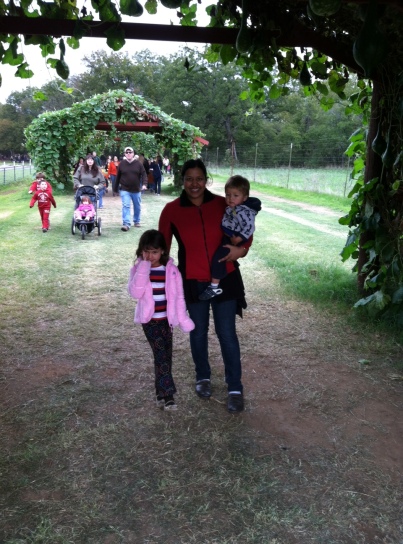
Are you ready for it? Here’s how you find out. Spend your first day of this simulation working and teaching etc., then find some extremely energetic and happy youngsters to cook dinner for, feed, and play with, get them to sleep, then sneak off for some work-time on a grant or paper until midnight. Go to bed, set your alarm to go off at 2 am, 3.30 am, and 5.15 am. Each time you are awakened, draw a random number between 10 and 60, and walk around or sit down and pet a little rag doll for that amount of time (optional: play a recording of a baby yelling at the top of her lungs while you do this). Finally, set your alarm for 6.15, so you wake up in time for the older child’s school the next morning. Repeat this every day for 1 year (your spouse alternates nights, if splitting duties half/half). Remember not to sleep in the day, so you can keep up with your teaching, research, and other duties. (If your partner is in science — and a great many women in science have spouses in science — he will keep a similar routine, won’t get to catch up on sleep either.) Not to sugarcoat reality, but I didn’t include deadlines and illnesses in this routine. Still, you get the idea. If you’re still committed to the cause (despite the challenges, I would do it all over again if I had to), here are some of the things we’ve learned about how to survive while enjoying our kids and our science —
1. Pick a supportive spouse. This is the single most important thing you can do if you want to have a family and do science. Supportive doesn’t only mean encouraging words (though it does mean that too), it means putting in equal amounts of time, or more time, than you in taking care of household things and the kids. (I’m curious to know if anybody has managed to do both science and family without a supportive spouse; I don’t think it can be done. If it can be, it can’t be pleasant.) [Re. actually living the simulation above, it helps greatly if your spouse is the one who’s a light sleeper; if at all possible, pick an endurance athlete, these guys know how to suffer.] The even split of family duties means that the question of “how-does-she-do-it” should be “how-do-they-do-it” or “how-does-he-do-it”, in equal measure. When sharing duties equitably, men should get as much admiration and commiseration as women; I know my husband deserves it. That will be when as a society we’ve truly arrived at the point where we can make more progress on the work-family balance problem.
2. Spend money on services: outsource. Yes, scientists are not rich. But money spent on services has been the money well spent, for us. Hire babysitters, housecleaners, gardeners, lawn mowing services, any logistical help you can manage to outsource. You help the economy, give somebody a job, and buy yourself critical time you can spend with your family or your work, or just relaxing a little. And, the children thrive with other loving adults in their lives, who bring different personalities, experiences, and styles to their games and activities. I cannot recommend this more highly.
3. If possible, take an extra year in a postdoc position that has been scientifically productive, when you mostly need to write papers, to have your first child. Writing and childbearing go great together — you can write when you’re home and be productive even when you can’t get into the lab. Another good time for a child is if you can stay an extra year as a postdoc with your Ph.D. advisor after your have defended your thesis, again finishing projects/writing papers.
4. Enjoy your kids! They’re full of joy, and young only once. If you’re constantly busy and stressed, or feel you’re underperforming, try to focus on the two things that are most important: your family members and your science, and ignore the rest. The house might be messy, or other mothers might bring hand-frosted cupcakes with little figurines to your child’s school, but really, maybe making a new discovery or sharing science with a new generation of kids — your own kids and the kids at your university — is an equally cool achievement?
Daphne Bavelier
Professeure Ordinaire, University of Geneva, Switzerland and Research Professor, University of Rochester, NY
I am a Biology graduate of the Ecole Normale Superieure, Paris, France. This French institution established in 1847 has as its mission to train teachers and researchers. I got hooked on research right there, having the luxury to create my own curriculum mixing biology, psychology, and computer science, all with an eye toward understanding mind and brain. I now head a research group that focuses on brain plasticity and learning, with a particular focus on how new media such as video game play may be leveraged for cognitive enhancements.
I have benefited from highly inspiring and supportive mentors all my life long. While in France, my mentors were all male….. – Philipe Ascher, Jacques Mehler and Juan Segui. While in the US, I benefited from the support of three amazing women scientists – Mary C. Potter at MIT, a pioneer and role model for many mixing an academic career with raising 4 children in an environment much more hostile than we can ever imagine today; Helen J. Neville at the Salk Institute, such a believer in the importance of science in society that she can move mountains all the while raising a boy mostly as a single mom; Elissa L. Newport, a natural born leader, both at work where she helped shape departments, institutes and centers as well as at home with her two children. Remember you don’t have to do it all alone….
Back when I was in France, and expressed my interest in doing one-year abroad as a lab tech in the US, my three French mentors were clear no one would want an inexperienced young student who spoke broken English, as a lab tech. There was a moment of hesitation and self-doubt, but through discussions, they all encouraged me to apply to graduate school in the US and supported me all the way. I graduated four years later from the Brain and Cognitive Science department at MIT. I then completed my training in human brain plasticity at the Salk Institute, San Diego and joined the Neurology faculty at Georgetown University where I proceeded to deliver twins 9 months after my start date. I had managed to ‘hide’ my pregnancy until well into my 4th month of pregnancy, at which time I began to have contractions and was told I would have to undergo bed rest. The meeting with my superiors in the administration was brief. Upon exposing the news that I was pregnant with twins and experiencing some difficulties with my pregnancy, all I got was the following question ‘So what are you planning to do?’ I snapped back ‘Deliver two babies and keep working’. A long silence followed and I understood that would be the extent of the discussion. And yes we did have lab meetings with me in my hospital bed… I delivered my third child while an Associate Professor in the department of Brain and Cognitive Science at the University of Rochester, a year before coming up for tenure, and 4 years after the twins. All this to say there is no better or worse time to have kids – do it when it fits your desire and not necessarily your work schedule.
I can now turn back and ask how I did it – but frankly at the time, the question never occurred to me. I just wanted to do it and so it had to be done – A good dose of stubbornness and a just-do-it attitude does go a long way!
As you can read in the other posts, having a supportive partner is also key. This does not mean your partner has to sacrifice their career for yours; my husband is also a successful academic, but yes the two-body problem means he turned down jobs he really wanted and I missed out on job opportunities because it was known I had a two-body problem. These were always open decisions about the type of lives we wanted to pursue, and not one of us doing a favor to the other. And truly, having a partner that values my passion for my work has been tremendously helpful.
A recurring point is one’s approach to motherhood. There are probably as many ways to manage this one as there are mothers! Having outstanding nannies was crucial when the kids were young, but as you transition into adolescence, they need you or your partner… So be aware – you will be in demand always. On my side I have found it amazingly helpful to raise my three children to be independent and responsible for their actions from very very early on – and yes that does mean one almost fell in the elephant pit at the zoo. When I lifted my screaming 3-year old daughter from the bush that saved her from hitting the concrete bottom, I did not hug her or console her right away, but rather we had a talk about the fact that all was ok now, but the lesson was that when mom says not to climb on the fence, she does so for a reason. I can let you imagine the many dark looks I got from other responsible adults around. I have gotten those dark looks many times; it certainly did help to have the French perspective on raising children! I also found it key to make it clear when I am available for them and when I am not, especially at home… this probably has been the hardest for me to learn. Raising children is ‘an exercise in negotiation with oneself’ writes Tatyana Sharpee – and indeed we think we shape these little minds but they shape us as much, if not more. So don’t worry, if you feel you are going through much soul-searching – it is part of the process.
Give yourself the means to support a family. Think ahead on any salary negotiations, ask male friends how they would do it, look at what your value on the market is. Don’t ask just for what you need now, but plan ahead.
And most importantly, enjoy!
Maria Neimark Geffen
Assistant Professor, University of Pennsylvania
Maria’s lab studies the neuronal mechanisms of hearing.
Since as far back as I can remember, I wanted to be a scientist. Early on in college, I took a computational neuroscience class, and realized that the brain is really what I would like to study. My career path has been rather linear – a five-year Ph.D. straight out of college, followed by a four-year postdoc, followed by an assistant professorship. My postdoc institution provided exceptional support for young scientists with children – a first-rate on-campus daycare, which allowed me to come in and feed the babies during the day, and stay a little bit later in the lab before picking them up. Also, my parents were within commuting distance, eager to help with their grandchildren. My advisor was very understanding, as his family was growing as well. My husband and I decided that there might never be a better opportunity and before we knew it, we had a toddler boy and a baby daughter.
I was lucky to have had such a supportive environment at work and at home that the hardest tasks were all for me to solve in my head. The trickiest thing was to learn how to fit the science into the rigid schedule that is needed to be able to take care of the kids when both parents are working. In my PhD, I would not think twice about staying in the lab until 3 am if the experiment needed it, whereas with the children, on most days I have to leave at a specific time no matter what. It helped me to read up on time management and to think carefully about planning my hours every day. And now that I have my own lab, and the load on my shoulders is much heavier, the key has been recruiting dedicated and talented young scientists and organizing them to work collectively. I am expecting another baby in a few weeks, and everyone in the lab has a plan worked out for the rest of the summer of how to proceed without my constant presence and knows what everyone else’s plan is. As the result, I feel exceptionally fortunate to have a wonderful family and a creative and productive job and career.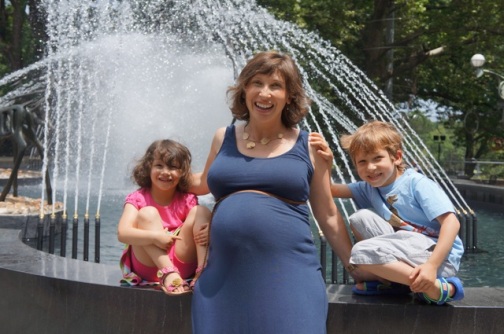
So my advice to young women (and men) in science is to be bold, believe in yourselves, but also think about both science and family carefully when making decisions. Take the hard route scientific goal-wise, but make the logistics of the family life as easy as you can on yourself. You need more hours than there are in a day to do science and raise a family, so chose your institution and your mentors carefully – they have to be ready and willing to help and to give you the extra time you need. Be sure you really like the people you work with and especially the people you hire into your lab. You need to rely on them much more than you can imagine. Build a strong team at home and at work. And take all the help you can get — you deserve it!
Eugenia Chiappe
Principal Investigator, Champalimaud Neuroscience Programme
Eugenia’s lab studies visuomotor integration in flies.
I have been intrigued about how things —living things- work since I was a little girl. I studied Biology and then specialized in sensory systems during my PhD. Since then, my research has been focused on the link between neural circuits in the brain and animal behavior. I have been a scientist for much longer than a mum. I do admit that I have thought academic life was incompatible with raising a family. Perhaps there are a couple of reasons for this kind of thinking: first, I am a very passionate person, I have been lucky enough to love what I do, and I fully commit myself to it. Naturally, I had not imagined that I could do different things at the same time at a level of personal satisfaction I demand. Second, I grew up in a family where my mum has given up her profession to raise her three daughters. Such an important model of life can be very influential on one’s own imagination.
But let’s face it: academic life is very demanding, and so are kids and parenting. While it is early to say whether I will succeeded in both being a scientist and a mum, for I have been leading my own group for about only a year, and my sons are 18 months old, I should say that I was wrong when I thought developing a professional career and a family are exclusive endeavors. If you want to do it, have faith on yourself, get well organized, be sure you look for a supportive environment and ask for help. TONS of help! There are several important pieces that, in my opinion, will facilitate your progress.
The first and most critical is to share parenting with a very supportive partner who understands your personal developments. The second important piece is to be in a work environment that supports young scientists, both women and men, with children. I am lucky to have both pieces together, I have an amazing partner who does not only support my career but helps me to improve it. And I am also very fortunate to work at a place where there is equal representation of genres leading research groups, with the majority of lab heads being parents as well.
A third important piece is not to be too hard on oneself, and try to keep guilty feelings to a minimum. Time management is a plus. If you are a very organized person, you have great skills; if you are not, you will learn how to be. Last but not least, let-go control is also very important. Not only you need to construct a team at home to help you with daily routines, but you also need to build one at the lab: a team that can grow and be a slightly independent.
Developing both a scientific research program and a family are very stimulating, and contrary to my original thoughts, can be synergistic if you are clever enough to distribute duties properly. Have fun with both processes!
Catherine Carr
Professor, Dept Biology, University of Maryland, College Park, Maryland
Catherine’s lab studies sound localization circuits in birds and other reptiles. The work centers on neural computation and the evolution of vertebrate circuits.
I always wanted to be a biologist – my mother was an artist and my father a professor of engineering, so I had clear idea of what academic life was like. I was also fortunate enough to go to a girls only high school, and then to the University of Cape Town, which had a significant number of women faculty. It was only when I started graduate work in the US that I was confronted with archaic attitudes about women in science. My advice is to rise above them.
Advice about work life balance. My postdoc mentor, Mark Konishi, who just retired from CalTech, had this famous saying “kids slow you down”. His former students and postdocs stand around at meetings and laugh about this before passing around the baby or college graduation pictures. Kids do slow you down. This is a not a bad thing, but there are some coping strategies and some strong desires for societal change that I can share.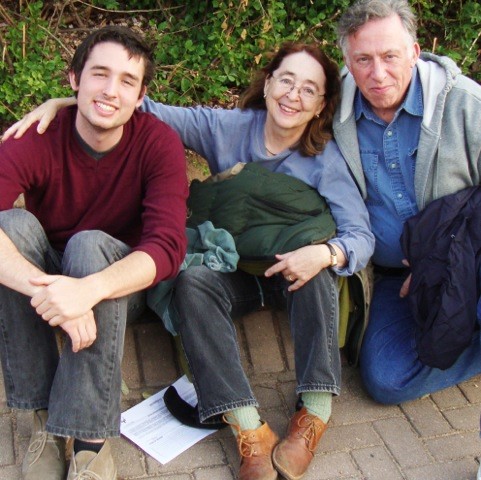
Everyone who’s contributed to this blog points out that money and family support helps. Ask for raises because childcare is expensive and universities (with rare exceptions) do not provide enough affordable, accessible child care. This must change and change now. Money – I’ve heard women tend not to ask for raises, feeling that we are paid for what we do. This is not true; pay is what you negotiate. Go armed with information and practice negotiations if necessary.
Families and friends and nannies can be wonderful sources of support. Although I became a single parent, I had lots of family support. My mother and son spent many a summer at Woods Hole or some international conference. We’d turn them into family vacations before or after the meetings. Arrange childcare at meetings. And while I’m talking about money, pay someone to clean your house.
Work at home and make friends at your children’s school. It’s easy to write at home and help a kid with homework. I took off every Monday afternoon for years, first to run a web club at the elementary school, and later to be home when my teenager came home from school with friends. Another family took Fridays’, and someone else took the kids to soccer practice. Maria Geffen wrote about time budgets. My kid’s in college now, but I still remember rushing to get home in time to pick him up and cook dinner. Squeezing time; I can’t provide a Time Turner, but nowhere is it written that you have to stay late at work unless an experiment calls for it. In which case, arrange a sleepover or a babysitter. Promotion and tenure depend on what you do, not how long you spend at work.
Times are changing. NSF funds an ADVANCE program that focuses on keeping women in science, and I have learned a lot from ours. First, the federal Family and Medical Leave Act acted as a catalyst at Maryland to change their policy. Now all faculty (tenured, tenure-track and non-tenure track) are entitled to 12 work weeks or 60 days of job-protected family and medical leave. Familiarize yourself with your universities’ policies about leave and tenure delays. They hired you and want to retain you. Our ADVANCE program has brought in a number of speakers who study retention. The one who made the greatest impression on me was Mary Ann Mason, the first woman dean of the Graduate school at Berkeley. She’s produced a few videos that I recommend. Try http://ucfamilyedge.berkeley.edu/marriagebabyblues.pdf. Chilling viewing – she had access to the entire UC graduate data base, and tracked career progress. These data reinforce what you will have read here. Child care and support matter.
Finally, my mentors, Mark Konishi and Walter Heiligenberg, and also many others (Janis Weeks, Eve Marder and Darcy Kelley to name a few) have supported and encouraged me. I’ve tried to pass along their good advice.
Adrienne Fairhall
Professor, Department of Physiology and Biophysics, University of Washington, Seattle
Adrienne’s lab studies mechanisms of neural coding and the algorithms that are instantiated by nervous systems in solving problems of behavior.
Growing up in Australia, I was incredibly lucky to have great science teachers, access to a rich science environment through Questacon science center, and a mind-blowing fortnight at Sydney University’s International Science School in high school to help me realize that being a scientist was what I wanted to do. My PhD years at the Weizmann Institute were formative in a couple of ways: I experienced the fun of truly collaborative and interdisciplinary science through my contacts with the neuroscience community there, and I saw examples all around me of students and postdocs—several years older than me, because of their army service– who were studying and moving through academic careers while raising families.
My son, now 11, was born during my postdoc. The timing worked well: I interviewed for jobs while 6-7 months pregnant, and was able to defer my position at UW for a year while he was an infant and my husband was in graduate school. My department’s attitude to my pregnancy was amazingly supportive (one male professor told me how he had lectured with his daughter in a chestpack; and when I came for my second interview, they set aside the library as a nursing room and hideout for my husband and my six week old baby) and a key determinant of my decision to accept the position. My daughter was born while I was an assistant professor. Over the years we have used all possible forms of childcare according to what we could afford and what the kids needed: full-time daycare, part-time babysitters, nannies, and an au pair. Before my son turned one, he needed some extra time out of daycare and I found a way to accommodate that. And that influenced my choice to take an extra quarter of part-time leave following maternity leave with my daughter. I’ve been lucky to have a partner–we met at the Computational Neuroscience course at MBL in Woods Hole!– who is utterly supportive of me professionally and a very committed parent.
Now my kids are a bit older, the greatest cost of parenthood is fragmented concentration. Modern children have surprisingly complicated lives. I’m sure one can keep things simpler than I do, and handle it all more efficiently. My husband’s inability to do family logistics is, I have learned, not universally but statistically significantly gender-characteristic and is not to be attributed to
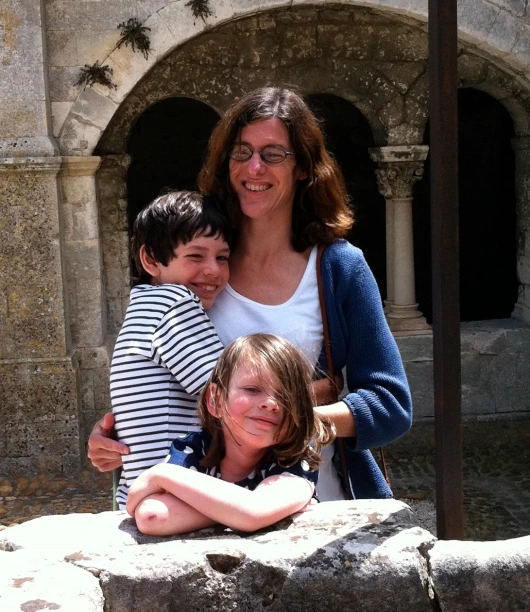
personal failings. This is better appreciated sooner than later. Finding the right balance of responsibilities in your partnership, if you are fortunate enough to have one, is the primary drama of early family life.
It is important to look for sources of positive energy. As a lab head you need to be that source for your mentees, and it can be hard when you have many emotional demands on you; seek out colleagues, friends, family and lab members that replenish you. Generosity with your own positive energy will help to build the many different kinds of relationships that will help to sustain you. Be willing to allow other caregivers into your child’s life. Many of us live isolated from extended family and children are happy to have more people to connect with and love. Be willing to accept professional help. A team that is pulling together, with due credit to all contributors, gets the work done quicker and better and lifts everyone.
Here’s some other useful and interesting links and stories…
- New York Times article: Why are there still so few women in science?
- Slate article on the “baby penalty”.
- New Scientist article on stemming the loss of women faculty.
- Anne Churchland’s list of women neuroscientists.
- Look at this! Profiles of 64 British science mothers.
- Here’s some great advice from a Harvard faculty mom about enjoying your job, enjoying your life, and not listening to advice.
Share your story! Email your story and a photo to howdshedoit@gmail.com .
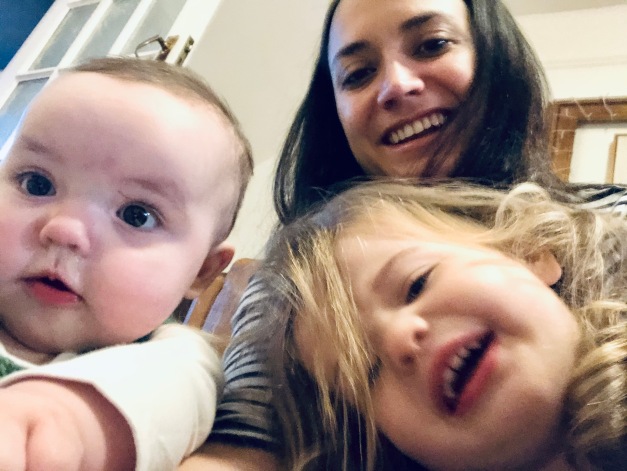
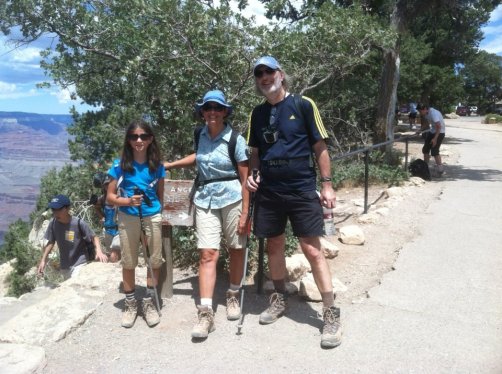
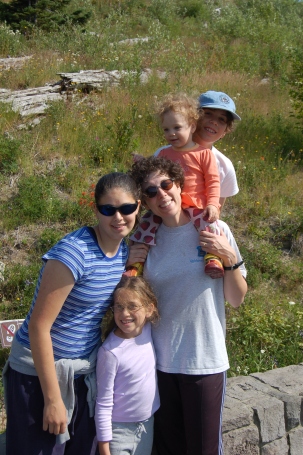
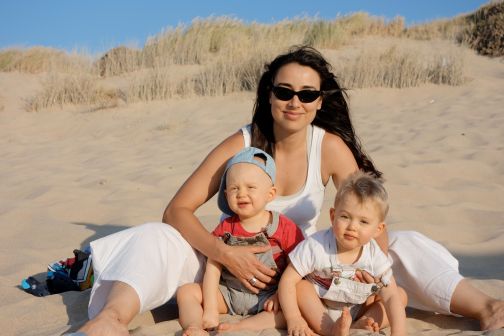
This is all incredibly helpful to read. Thank you ladies for sharing!
This is a great resource. I love it. Thanks so much for sharing. Am at a conference, so don’t have the time to read as in depth as I would like, but plan to return. 🙂 I would love some feedback on travel with children for scientific conferences. Have made a few blog posts on the topic (see links below), but think there’s lots we could learn in this space. Thanks for your ideas!
http://slowsearching.blogspot.com/2013/05/attending-conference-alone-with-baby.html
http://slowsearching.blogspot.com/2013/05/child-friendly-conferences.html
Pingback: Friday links: excessive coauthorship, inspiring links about moms in science, and more | Dynamic Ecology
Amazing resource and encouraging stories. Thanks for putting these together!
Thank you so much for sharing all these wonderful stories and tips! It makes me feel so much better and so much less alone! It also makes me much more aware of all the things I have (great daycare, great support systems, [now] a wonderful and understanding lab, etc.) instead of all the things I’m lacking. All of you are an inspiration and in the future, I hope I can help and inspire others following in my footsteps!
Excellent resource, thank you! There’s such a variety of ways to combine family and career. I liked the idea of babies with rank (“I had a graduate school baby, a postdoc baby, an assistant professor baby, and an associate professor baby.”)
For those interested in how spouses share child care, see also this website, blog, and book, which have lots more individual stories and solutions including our own.
Equally Shared Parenting
http://equallysharedparenting.com/
Here! here! to Gwenn Garden’s call for a “systemic change”! I am one of the leaks in the pipeline. Successful PhD, Stanford Postdoc, but quit after having a kid. Not because I don’t love science, but because I couldn’t justify the sacrifices I was asking my family to make. But even though I choose to leave academia. I agree with what these ladies say it takes to stay (support, support, support). Thanks for the bit..
I would love to hear you lady’s ideas on what “systemic changes” would look like?
My systemic-change requests: 1) No longer having to choose between a 1/2 walk (that adds up to 2 hours/day of lost time) and expressing milk in the smelly bathroom. 2) Less mandatory meetings. Between pumping and mandatory meetings I found I only had about 4 hours of undisturbed “bench time” every other day. Not good for a postdoc’s productivity. 3) Make it worth it .I am all for sacrificing. Including missing my son’s first steps (which I did) but when the job prospects are bleak it becomes hard to justify. I think we need to talk about putting a cap on PhD enrollment to insure post-post-doc jobs.
Your opinions?
Congratulations to Maria, their new baby is now a month old!
Pingback: A Really Busy Person’s Guide to Work-Life Balance | Commulink
Pingback: Breastmilk isn’t free: high points and challenges as a Professor + Mother | Tenure, She Wrote
Pingback: Parents in Science: Links edition | Erin C. McKiernan
Pingback: Stream - Karan Gill
Thank you so much for your candor about the realities of balancing children and a career in science. Too often when we have asked this question, we have been told “People make it work, it’s possible” – inherently implying that it was not scary or difficult in the current circumstances nor that things about the structure of science needed to change. I hope raising this awareness ultimately leads to changes in the childcare options at most universities and an adjustment of perspective.
Very brave women but as I see mostly in the field of Hardcore Science wwhich might be even more demanding, but there is another side of the coin namely young scientists in the field of soft sciences which means not paid, I have three kids and since 2011 I am doing science without any payments…i cannot even afford at my age to drop it off completely since it does not make sense to study a new subject or learn another profession….I actually regret that I did pursue as a mother of three children now this academic career and with postdoc with a great list of publications even with one book coming out i am nowhere as a postdoc, everybody else at my level are at some kind of tenure track positions….
Pingback: How Does She Do It? First hand stories and advice from successful female scientists with kids | Dresden Postdoc Community
Pingback: Work Life Balance (or so its called) | Recombination Landscape Evolution
Thanks for this, very inspiring interviews. I hope this is read by many!
These posts are great and in many ways are just as relevant to modern fathers who take on a significant fraction of childrearing responsibilities.
This is one of the best compilation of profiles and stories about their path to science and life I have ever read. Thanks for sharing, someday I want to work with one of them. We must all work to improve the path to be a successful scientist and family person for women.
This is so inspirational!
Thank you for your words of wisdom. I appreciate hearing your stories, especially since I grew up with a stay-at-home mom and many of my friends did as well — in that situation, it’s hard to make the choice to keep your career when having kids. This was inspiring.